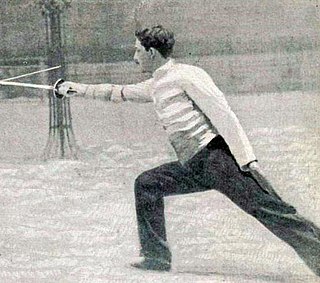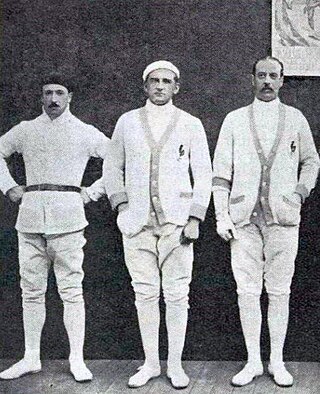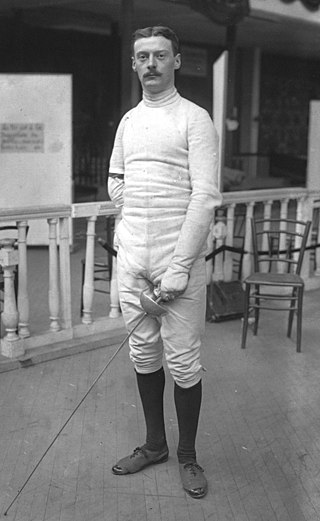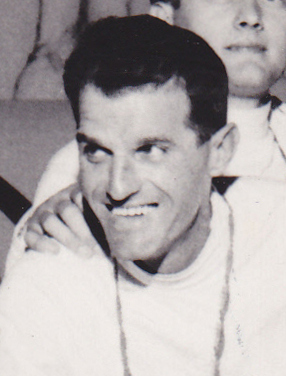
At the 1900 Summer Olympics, seven fencing events were contested. 260 fencers from 19 nations competed. The events took place at the Tuileries Garden.

The men's sabre was one of four fencing events on the Fencing at the 1908 Summer Olympics programme. The top two places were won by Hungarian fencers, who also took the gold medal in the team sabre event. Jenő Fuchs took the gold medal and Béla Zulawszky the silver. Bronze went to Bohemian Vilém Goppold von Lobsdorf. There were 76 competitors from 11 nations. Each nation could enter up to 12 fencers.

The men's épée was one of eight fencing events on the fencing at the 1964 Summer Olympics programme. It was the fourteenth appearance of the event. The competition was held from October 18 to 19 1964. 65 fencers from 25 nations competed. Each nation was limited to three fencers. The event was won by Grigory Kriss of the Soviet Union, the nation's first gold medal in the event after a bronze four years earlier. The Soviets also took bronze, with Guram Kostava finishing in third place. Between the two was silver medalist Bill Hoskyns of Great Britain; it was the second consecutive Games with a British silver medalist in the event. Italy's six-Games gold medal streak in the men's individual épée ended with the nation missing the podium entirely; Gianluigi Saccaro finished fourth after losing the bronze-medal barrage to Kostava.

The men's sabre was one of eight fencing events on the fencing at the 1964 Summer Olympics programme. It was the fifteenth appearance of the event. The competition was held from October 19 to 20, 1964. 52 fencers from 21 nations competed. Nations had been limited to three fencers each since 1928. The event was won by Tibor Pézsa, the final of nine straight Games in which a Hungarian fencer won the event. The silver medal went to Claude Arabo of France, with Umyar Mavlikhanov of the Soviet Union taking bronze.

The men's épée was a fencing event held as part of the Fencing at the 1912 Summer Olympics programme. It was the fourth appearance of the event, which had been introduced in 1900. The competition was held from 11 to 13 July at the Östermalm Athletic Grounds. There were 93 competitors from 15 nations. Each nation could enter up to 12 fencers. The event was won by Paul Anspach of Belgium. His countryman Philippe le Hardy took bronze. Silver went to Denmark's Ivan Joseph Martin Osiier, the only medal won by the perennial Olympian who competed in seven Games over 40 years. The medals were the first in the men's épée for both nations.

The men's sabre was a fencing event held as part of the Fencing at the 1912 Summer Olympics programme. It was the fifth appearance of the event.

The épée event for amateurs was one of three épée events at the 1900 Summer Olympics. 102 fencers from 11 nations competed, with 91 of them from France. The event was won by Ramón Fonst of Cuba, the first of his two golds in individual épée. Silver and bronze both went to host nation fencers, Louis Perrée and Léon Sée. These badly organized games — derisively called “The Farcical Games” — were so poorly publicized that years later, even the competitors were clueless that they had competed in the Olympics in 1900. No official records for the games exist. These accomplishments are not even mentioned in the 1911 Encyclopædia Britannica. This was the first appearance of the event, as only foil and sabre events had been held at the first Games in 1896; the Men's épée event has been held at every Summer Olympics since 1900.

The professional event in épée at the 1900 Summer Olympics had 54 fencers from 5 nations compete. The event took place from 11 to 14 June at the Tuileries Garden. The event was won by Albert Ayat of France, leading a French sweep with Gilbert Bougnol taking silver and Henri Laurent bronze.

The amateur foil competition had 54 fencers from 10 nations compete. There was no limit on the number of fencers per nation; 39 of the 54 competitors were French. For the first round, quarterfinals, and repechage, skill and art with the foil was more important to advancing than winning the bout. The event was swept by French fencers: Émile Coste, Henri Masson, and Marcel Boulenger took the top three places. It was the second consecutive Games that France had taken the top two ranks

The foil event for professionals involved 61 fencers from 7 nations. It was held from 22 to 29 May. The event as won by Lucien Mérignac, as France swept the top three places. Alphonse Kirchhoffer and Jean-Baptiste Mimiague were second and third, respectively.

The professional sabre competition at the 1900 Summer Olympics involved 27 fencers from 7 nations. It was held from 23 to 27 June at the Tuileries Garden. The event was won by Antonio Conte of Italy, with that nation also receiving second place with Italo Santelli. Austria's Milan Neralić finished third.

The men's épée was a fencing event held as part of the fencing at the 1920 Summer Olympics programme. It was the fifth appearance of the event. A total of 80 fencers from 13 nations competed in the event, which was held from August 20 to 23, 1920. Each nation was limited to eight fencers, down from 12 in 1908 and 1912. Of the six fencing events, the only one in which Nedo Nadi did not win a gold medal was the one in which he did not compete. Instead, a trio of Frenchmen swept the medals. It was Lippmann's second silver medal in the event, he having previously taken second in 1908; he was the second man to win multiple medals in the individual épée.

The men's sabre was a fencing event held as part of the Fencing at the 1920 Summer Olympics programme. It was the sixth appearance of the event. A total of 43 fencers from 9 nations competed in the event, which was held on August 25 and August 26, 1920. Nations were limited to eight fencers each. The event was won by Nedo Nadi of Italy, one of his five gold medals in 1920. His brother Aldo Nadi took silver. Adrianus de Jong of the Netherlands finished third. They were the first medals in the individual men's sabre for both countries. This was the only time from 1908 to 1964 that Hungary did not win the men's sabre—with no Hungarian fencers competing after the nation was disinvited after World War I.

The men's épée was one of seven fencing events on the Fencing at the 1928 Summer Olympics programme. It was the seventh appearance of the event. The competition was held from 6 August 1928 to 7 August 1928. 59 fencers from 22 nations competed. Each nation could have up to three fencers. The event was won by Lucien Gaudin of France, the nation's third victory in the individual men's épée—taking sole possession of most among nations above Cuba and Belgium, each at two. Gaudin was the second man to win both the foil and épée events at a single Games. It was the third consecutive Games at which France reached the podium in the event. Two Frenchman had reached the head-to-head final; Gaudin won over Georges Buchard, who received silver. Bronze in 1928 went to American George Calnan, the nation's first medal in the event.

The men's foil was one of seven fencing events on the Fencing at the 1928 Summer Olympics programme. It was the seventh appearance of the event. The competition was held from 31 July 1928 to 1 August 1928. 54 fencers from 22 nations competed. For the third straight Games, the limit of fencers per nation was reduced. The event was won by Lucien Gaudin of France, the nation's second consecutive and fourth overall victory in the men's foil. Erwin Casmir earned silver to give Germany its first medal in the event. Giulio Gaudini of Italy took bronze.

The men's sabre was one of seven fencing events on the Fencing at the 1928 Summer Olympics programme. It was the eighth appearance of the event. The competition was held from 10 August 1928 to 11 August 1928. 44 fencers from 17 nations competed. For the third straight Games, the limit of fencers per nation was reduced. The event was won by Ödön von Tersztyánszky of Hungary, the second in a nine-Games streak of Hungarian wins. Attila Petschauer, also of Hungary, took silver. Italy's Bino Bini earned bronze.

The men's épée was one of seven fencing events on the fencing at the 1948 Summer Olympics programme. It was the tenth appearance of the event. The competition was held from 7 August 1948 to 9 August 1948. 66 fencers from 25 nations competed. The event was won by Luigi Cantone of Italy, the nation's third consecutive victory in the men's épée. Italy also earned its third consecutive bronze medal in the event, with Edoardo Mangiarotti's third-place finish. Between the two Italians was Oswald Zappelli of Switzerland, taking the silver medal.

The men's sabre was one of seven fencing events on the fencing at the 1952 Summer Olympics programme. It was the twelfth appearance of the event. The competition was held from 31 July 1952 to 1 August 1952. 66 fencers from 26 nations competed. Nations were limited to three fencers each. The event was won by Pál Kovács, the sixth of nine straight Games in which a Hungarian would win the event. Kovács became the fourth man to win multiple medals in the individual sabre, adding to his 1948 bronze. Hungary swept the medals in the event for the second time. Aladár Gerevich's silver completed a set of three different color medals in the event, the first man to win three medals in individual sabre. Tibor Berczelly earned bronze.

The men's épée was one of seven fencing events on the fencing at the 1956 Summer Olympics programme. It was the twelfth appearance of the event. The competition was held on 30 November 1956. 41 fencers from 18 nations competed. Nations were limited to three fencers each. The event was won by Carlo Pavesi of Italy, the nation's fifth consecutive victory in the men's épée. In all five of those Games, Italy earned at least two medals in the event; this was the second sweep during that period for Italy. Giuseppe Delfino was the silver medalist while Edoardo Mangiarotti took bronze. It was Mangiarotti's third medal in the event, along with gold in 1952 and another bronze in 1948; he was the first man to win three medals in the individual épée.

The men's sabre was one of seven fencing events on the fencing at the 1956 Summer Olympics programme. It was the thirteenth appearance of the event. The competition was held on 5 December 1956. 35 fencers from 17 nations competed. Nations had been limited to three fencers each since 1928. The event was won by Rudolf Kárpáti, the seventh of nine straight Games in which a Hungarian would win the event. Jerzy Pawłowski of Poland took silver and Lev Kuznetsov of the Soviet Union took bronze, the first medals in the event for each nation and the first time since 1924 that any nation other than Hungary and Italy earned a medal in the men's sabre.




















